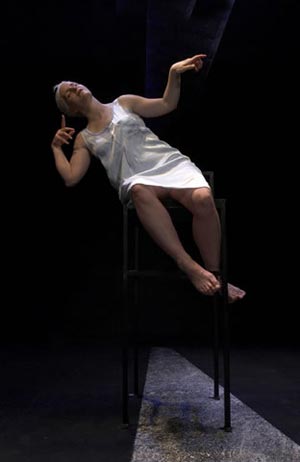| After a stage blackout, a second character appears, Marti's sister, spot lit on a vertical platform. Although afflicted by the tremors of Multiple Sclerosis, she directly affects us with her unfailing sense of humour and an ability to escape her personal problems.
A third character, a guardian angel, is, of course, a full embodiment of our notions of eternity, and the fact that she turns out to be the mother of Marti and her sister is no surprise in a theatrical piece that is all about a human world of illusion, shifting identities, and its ultimate state, that of mortal self-transcendence.
So when this kind angel offers the audience a choice of cookies — a round white cookie representing the full moon, a crescent cookie for indecision, and a brown cookie as a dark moon — Marti's acceptance of the dark cookie is what leads her on a spiritual pilgrimage to the empty spaces of Utah where she plans to leave behind her troubled mind.
Throughout a performance time of approximately 60 minutes, Batdorf successfully depicted the drift of human consciousness — variously defined by Antonin Artaud as human 'action' that goes beyond words or, as proposed by Allen Ginsberg in his Indian Journals, as a blissful state of super consciousness attained through the use of drugs.
|
|

Erika Batdorf (Photo by David Leyes) |


